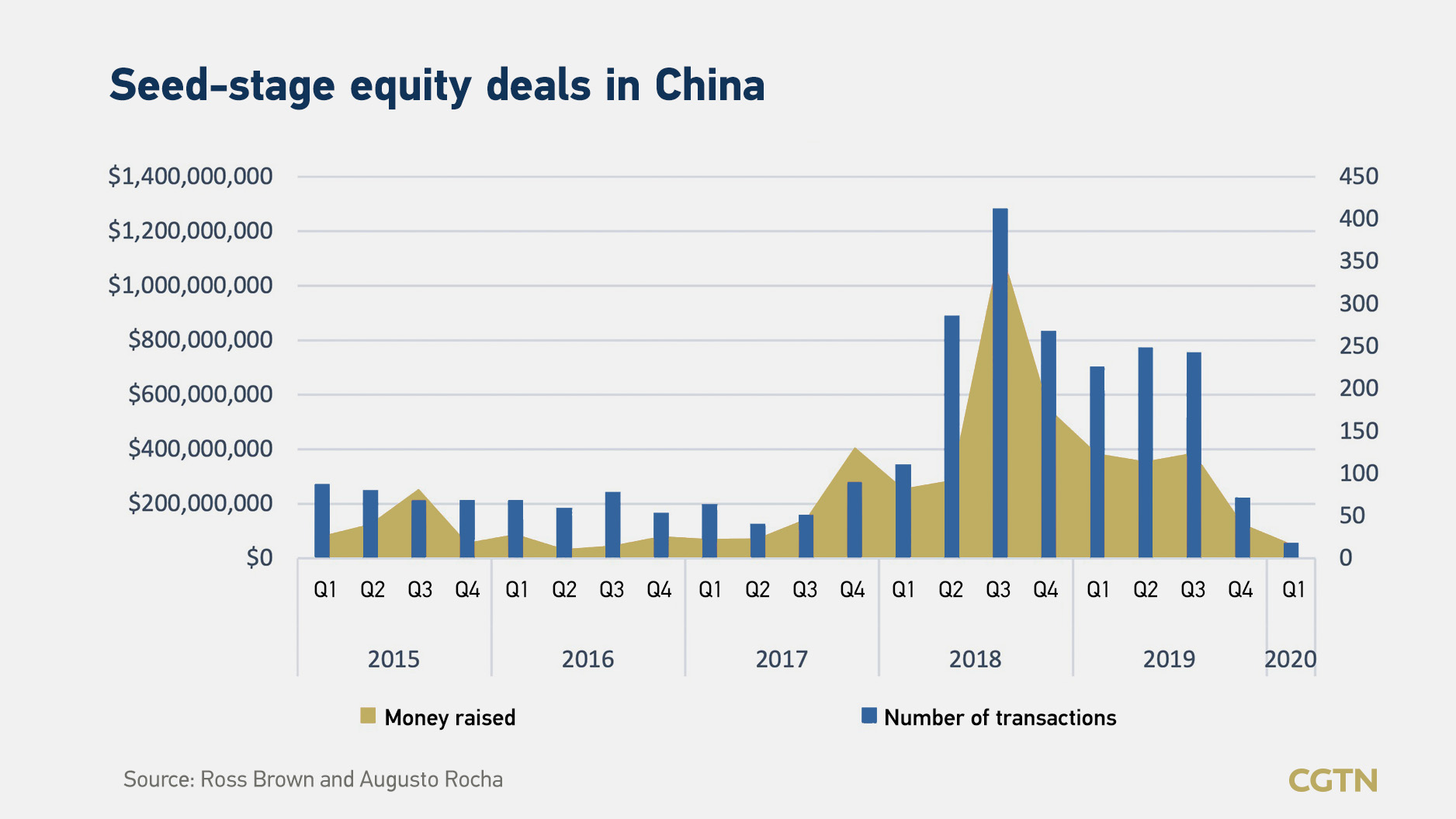03:24

Editor's note: This story is part of our continuing "Startups" series, which comprises investors' and entrepreneurs' views on developing the venture capital market and entrepreneurship situation in China amid the COVID-19 pandemic. You can read the first story here.
The COVID-19 outbreak has had a significant impact on the venture capital market, as investors become more cautious about their investment decisions amid the epidemic. Face-to-face meetings and business trips have also been limited, making due diligence even more challenging.
"A lot of VCs (venture capitalists) actually stopped bringing new deals to their investment committees because they can't meet and get the feel of [startup] founders," said Zhao Chen, managing partner of the startup accelerator Plug and Play China.
The most nascent startups are those most heavily impacted by the epidemic, according to a research paper by the University of St. Andrews professors Ross Brown and Augusto Rocha.
The "capital winter" began last year when the venture capital boom turned into a bust. 2018 saw a record level of seed-stage funding in China. The number of seed-stage equity deals almost quadrupling from just over 100 deals in the first quarter to over 400 in the third quarter. However, the deal flow fell by two-thirds from 226 to 71 in 2019.

Due to the novel coronavirus shock, the decline became further magnified between the final quarter of 2019 and the first quarter of 2020, and seed-stage deals significantly decreased, to less than 20 in total in the first three months, suggesting that startups could be starved of finance during the epidemic, according to Brown and Rocha.
Although venture capital funding in the country rebounded in March, with Chinese startups raising over $2.5 billion, sixfold the $410 million raised in February, it still plunged by more than half to $3.8 billion in the first quarter compared with the same period last year, according to data from the Asian Venture Capital Journal.
Speaking to CGTN, investors Shaw Wang and Liu Chengcheng and young entrepreneurs Wu Weili and Song Minjie shared their views on the epidemic's impact on venture capital funding in China, whether it is a short-term impact or a more enduring feature of risk on the Chinese market, and how startups can get seed-stage funding in a hard time.
Wang is founder of Unity Ventures, one of the leading early-stage venture capital firms in China. He was formerly a member of Baidu's founding team. Liu is founder and chairman of 36Kr, China's equivalent of TechCrunch, and an angel investor.
Wu is CEO of Beijing Zhishi Information Technology Co., Ltd., which provides commercial consultancy for growing companies with Series-B financing. Song is CEO of MicroVcard, a startup that provides electronic business cards services through WeChat applets.
The following are excerpts from the interviews, edited for brevity and clarity.
CGTN: What's the epidemic's impact on venture capital funding in China?
Wang, Unity Ventures: Venture capitals invest in an expectation of the future. If we expect no large-scale epidemic outbreak in China in the future and no strict restrictions on business activities and travel, then our investment will not be greatly affected. I think it has returned to normal. Our capital environment is improving, and China will be the world's best market for startups with the highest return rate on venture capital in the next 5-10 years.
Liu, 36Kr: I think investment came to a halt in the first quarter in China, due to the epidemic's impact as well as the Chinese Lunar New Year break. But investment in the second and third quarters was much better than the same period last year, as the epidemic accelerated the country's launch of the registration-based IPO system on the ChiNext startup board in Shenzhen.
Wu, Beijing Zhishi Information Technology Co., Ltd.: When I started my business at the end of 2018, I met with some investors, and I felt the environment became challenging. Now, it's more challenging than before. Previously, you could get financing by a PPT (PowerPoint Presentations) even without a team. You could tell investors if there was money, you would gather the talents and start a business. But now the chances are small.
Song, MicroVcard: I feel the current market is indeed worse than before the epidemic. Our team is at an early stage, and we definitely hope to expand. But we have become more cautious in our business activities, as we know little about the epidemic's impact on our customers' preference, and investors will definitely become more cautious.
CGTN: How can startups get seed-stage funding amid COVID-19?
Wang, Unity Ventures: I think when your business has developed to a certain level with good performance, you should seek financing. You don't need to care too much about the valuation and pricing because it is the pace of financing that is more important, which means you should get funding as soon as possible and improve your business to a higher level. It usually takes 2-3 months for the first round of financing and 3-6 for the second round. The capital raised should be equivalent to the company's cash flow for 12-18 months.
Liu, 36Kr: I think a good business plan must clearly state what you are doing, how you want to do it, how much money you need, who you are going to recruit, what techniques and methods you are going to use to achieve your goal with the lowest cost and shortest time, and how to achieve the second goal after the first goal is achieved. It is the simplest logic of a business plan.
Wu, Beijing Zhishi Information Technology Co., Ltd.: Entrepreneurs should polish their products to achieve better data growth and then find investors so that the financing will be easier. Entrepreneurs should also communicate with investors more frequently so that they can add more information that has been missed in one presentation submitted online for investors' judgment. Moreover, entrepreneurs should know whether financing is a seed round, angel round or another round, and then look for investors in that round because investors in Series C and D rounds do not care about investment in angel round.
CGTN: Can you provide some specific advice for first-time entrepreneurs?
Wang, Unity Ventures: A bear or bull market does not appear to have a significant impact on starting a new business. It is the industry's cycle that is more important. I think now that the industry has entered into a relatively in-depth and technology-driven field, there are good opportunities to start a business in these fields.
Liu, 36Kr: If you start a business for the first time amid the epidemic, you need to take the normalization of epidemic control into consideration. You must enter into a market rationally, organize a good team and raise funds for at least two years. If you get funds for just one year, you may run out of funds before you try an idea out.
Wu, Beijing Zhishi Information Technology Co., Ltd.: It is important to find your core and differentiation advantages, as well as what value those advantages can create. When you encounter problems, you can talk with investors. Whether the feedback is positive or negative, or even if there is no feedback, it is actually a kind of feedback and is helpful.

